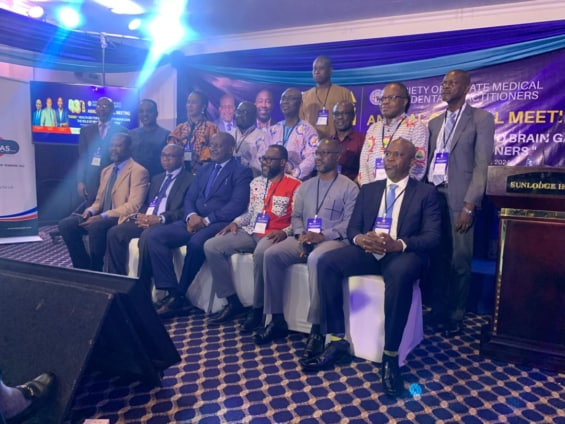According to the President of the Pharmaceutical Society of Ghana, Pharm Dr. Samuel Kow Donkoh, the last time the government employed pharmacists in the Ghana Health Service was in 2020.
This leaves many pharmacists jobless, and this situation is quite worrisome because the government is generally the biggest employer within the country.
“Since the year 2020, pharmacists have not had any permanent employment in the Ghana Health Service. So if the government, being the biggest employer, has not employed any pharmacist into permanent jobs then it is quite a worrying situation for us,” he said.
Pharm Dr. Donkoh disclosed this while speaking at the 43rd Annual General Meeting of the Society of Private Medical and Dental Practitioners.
The four-day event, themed “Health Sector Brain Drain to Brain Gain: The Role of the Private Practitioners”, brought members of the Society and other sister associations and unions together to deliberate on how a lasting solution could be found for the canker.
For Pharm Dr. Donkoh, the mismatch between the number turned out of healthcare practitioners and available job opportunities is a major problem.
“The brain drain issue is a very worrying situation for all of us. Not only the medical doctors but all healthcare professionals, ” he said on Friday.
Pharm Dr Donkoh noted that with eight pharmacy institutions in Ghana, the country turns out some 1,000 pharmacists every year.
For the past four years, however, the government has not given permanent employment to these fresh professionals.
This lack of opportunities has seen many young pharmacists seek employment abroad, thus exacerbating the brain drain problem affecting the health sector.
“Of course, people would want to stay and work, but job opportunities are not available. And even when they are here, pharmacists are not adequately remunerated. These are the two factors which are pushing our members out of the country,” he said.
He called on the Government to make a conscious effort at employing pharmacists to reverse the trend.
He suggested that employing 400 to 500 pharmacists annually will ensure that every health facility in the country has a pharmacist.
“Anywhere medicines are being dispensed, we need to make sure that there is a pharmacist. Not only will pharmacists be available in the pharmacy department, but they will also be at the various wards to provide pharmaceutical services,” he noted.
Pharm Dr. Donkoh also highlighted the role of the private sector in providing job opportunities for pharmacists.
He called on regulators to create an enabling environment for the engagement of more pharmacists in the private sector.
“The law states that ‘Anytime a pharmacy is opened, there should be the presence of a pharmacist’. If the regulator insists on that, it will create employment opportunities for our members,” he said.
He further called for over-the-counter medicine sellers to upgrade to full pharmacies and employ pharmacists.
“At the time they were granted licenses to operate as over-the-counter medicine sellers, Ghana had only one Pharmacy School, KNUST, which produced about 50 pharmacists a year. We have eight today, producing about 1,000 to 1,500 every year.”.
“With these figures, we shouldn’t be finding over-the-counter medicine sellers in the regional capitals and others. All these people need to upgrade into pharmacies and employ pharmacists to create more job opportunities,” he intimated.
As for her view, the President of the Ghana Registered Nurses and Midwives Association, Perpetual Ofori-Ampofo, expressed alarm at the high rate of immigration by nurses.
She went on to add that the mass exodus of nurses has largely opened holes in the health system, making those who are left behind overloaded.
“Colleagues’ immigration threatens the safety of our patients and our own as health practitioners.”.
“Their departure has caused serious gaps within the health system because the workload of those at post has increased, and this may cause you to make wrong decisions or cause medical errors at one point or another.”
Amplifying Madam Ofori-Ampofo’s sentiments, President of the Ghana Dental Association, Dr. Cecilia Kakraba Quashie, said mentorship is one such strategy that would help cushion the impacts of the brain drain.
“I strongly feel that deliberative mentorship is one important aspect lacking in our health profession. I appeal to each and every one of us to take the responsibility of mentorship, guiding, and supporting at least one young professional in our respective fields.
“By so doing, we will have a culture of knowledge-sharing and growth with collective success, and hopefully, this might keep some of our young people here,” she said.



